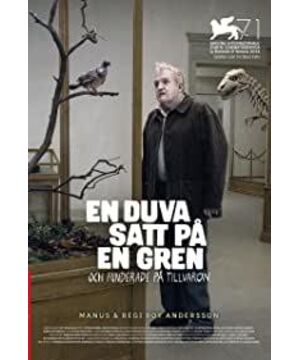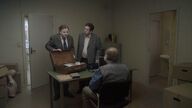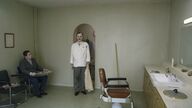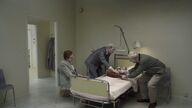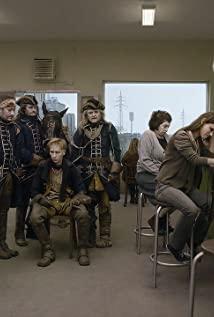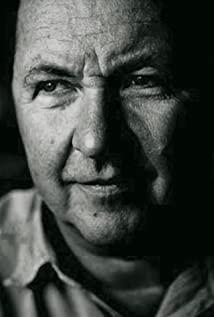Few works, low exposure, and the superposition of various factors make Anderson rarely mentioned by fans, but this does not prevent him from becoming the most outstanding film artist in contemporary Sweden. The last three of the five feature films: "Life About Human Nature" Each of the "Trilogy" is a classic. In 2000, "Singing from the Second Floor" won the Jury Award at the 53rd Cannes Film Festival. You must know that Cannes that year should be the most competitive since the new century. Jiang Wen's "The Devil Is Coming", Yang Dechang "Yi Yi" by Wong Kar-wai, "Dancer in the Dark" by von Trier, "Artificial Paradise" by Shinji Aoyama, "Love is a Sonny" by Inarido, and Michael Ha Neck's "Paris Ukiyo-e" competed on the same field, and the degree of splendor was evident. That is to say, in such a master showdown, Roy Anderson still blazed a trail and proved his strength with his works. The final chapter of the trilogy, 2014's "Hard Branches and Quiet" also helped Anderson successfully capture the Golden Lion at the 71st Venice Film Festival, and Roy Anderson has finally returned to the public eye.
As a master of Roy Anderson's artistic style, the "Trilogy of Life" embodies the director's profound thinking on film art and human society. These three films that lasted for 14 years have deeply restored Sweden with absurd and ridiculous black strokes. And even the core survival paradox of the entire human society: Is it the progress of human civilization or the transformation and alienation of human nature that social systems and moral norms bring about? Are seemingly ordinary daily behaviors leading human beings to gradually fall into a huge collective unconscious sexual fornication? Does the value of reason need to be re-evaluated and considered? The director internalized thinking about these issues into his own unique video style, and finally presented it to audiences all over the world in the form of a trilogy.
In Roy Anderson's film world, the story clues are deliberately obscured. The director chooses to intercept scenes in daily life for image collage, and uses a large number of life fragments to construct his own narrative text. This unique aesthetic logic makes the shaping of character images a key link in understanding the rationality of film narration. Whether it’s the little boss who burned down his furniture store in "Song from the Second Floor" or the literary girl who obsessed with rock musicians in "You Are Alive", each character seems to be a victim of the background of the times, and their faces are pale. Hollow eyes, slow action, sluggish thinking, falling into the vicious circle of life and unable to leave, this emptiness of the spiritual world in the director's eyes is the greatest harm to human nature by social systems and codes of conduct: facing more and more standardization and patternization In the world of humanity, human beings are being forced to continuously adjust themselves. The most precious free will in human nature is gradually disintegrating and alienating in the face of the powerful material world, making all people as society become walking corpses with facial makeup, and their individuality and dignity are forced. To the corner of the times.
This Kafka-like distortion of human nature highlights Roy Anderson’s deep worries and reflections on the law of development of the entire human society. Kafka’s Gregor ("The Metamorphosis") and K ("Castle") begin Appeared under the lens of the director, walking on the cold Swedish streets in an alienated and detached attitude, all kinds of absurdity and black humor began to be played out: the company employee who worked half his life was inexplicably fired, and the young people were inexplicably dismissed for writing poetry. And being sent to a mental hospital, amateur musicians were cheated of all their pensions, merchandise salesmen ran into Charles XII in a bar... Surrealism as a means of expression jumped from Kafka’s novels It has become a sharp thought weapon for the director to criticize reality and question power. This creative technique of using character-guided narratives to satirize reality is actually traceable in art history, ranging from Chekhov’s short stories "The Man in the Set" and "Chameleon" to Kafka's "The Trial". "And "Castle", the discussion about the alienation and transformation of human nature has never stopped. The difference is that Roy Anderson, on the basis of inheriting the artistic concepts and thinking traditions of his predecessors, creatively nests magical realism and the contrast of dreams to reality in his own images, and confronts them with rough but sophisticated lens language. Inherent ethics speak for the free will of mankind.
Personally, I think that the method of weakening the narrative to enrich and strengthen the character image is actually a relatively new concept of film creation. In recent years, many directors have also tried this kind of anti-traditional narrative. A more typical example is the "Patterson" that Jim Jamush got in Cannes last year. The film is a very personal expression. The plot becomes the appearance, and the corresponding character relationships and psychological changes become The protagonist of the whole film. From this perspective, Roy Anderson seems to have unintentionally led a trend of creation that is not big or small.
In addition to the emphasis on portraying and reshaping the characters, Roy Anderson’s "Trilogy of Life" is also full of the coldness and neatness of the Nordic directors in the lens art and composition of the picture: insisting on using the length of one shot. The lens, the exquisite image ratio, etc., everywhere reflect the author's careful creative attitude. Of course, the reason why the director chooses this lens language is ultimately related to the theme of the film. The fragments of life, absurdity and seriousness, joking and compassion, all of which are themselves a set of contradictory concepts. There are a lot of contradictory concepts in the film. The regular geometric composition of the film reinforces this contradictory opposition and unity from the form, and enhances the rhythm and impact of the film.
From the perspective of accepting aesthetics, a well-ordered picture composition can easily give the audience a sense of solemn order. In Roy Anderson’s films, this kind of order and norms on the picture are exactly the same as the surreal plot. A strong contrast and contrast are produced, and a visual sleepwalking of jumping out of life and returning to life is completed, thus raising absurdity and banter into a philosophical proposition that contains double contradictions. On the one hand, human society creates rules and systems, the purpose of which is to help people who are socialized have a better survival experience. On the other hand, this kind of solidified social norms restrains individual behavior while also subtly changing The most creative part of human nature is excluded from life, the system opposes people, and it has become the initiator of the alienation of human nature. In "Hard Branches and Quiet", the salesmen selling comedy toys have been eager to bring happiness to the people around them, but they themselves have been depressed, struggling constantly between faith and reality; "Songs from the second floor" In, the experienced magician had to carry a suitcase and set foot on the far train after the failed performance. In the face of the powerful material world, the balance of human nature is constantly tilting, suspicion and confusion appear repeatedly, the mind and body are torn and split between each other, and people begin to live and work with expressionless faces until death comes. A good director will find suitable forms of expression to cooperate with the theme of the film itself, so as to turn the whole film into a complete work of art. Roy Anderson is undoubtedly a master.
Loneliness is another obvious theme of Roy Anderson’s "Life Trilogy". Life is lonely. The whole world is full of absurd and illogical phenomena. However, life requires you to constantly think and pursue. Exploring its own survival value, this misplaced match is full of black humor. The characters in the movie walk past the camera with no expression, just like Estella sitting on the side of the country road for a long time in "Waiting for Godot" Gang and Vladimir, anxious and confused, waiting for Godot, who will never come. According to Roy Anderson, there are many sources of loneliness. The two most important reasons are the imprisonment of freedom by institutional norms and the inherent limitations of language as a communication tool. In the film "Songs from the Second Floor", the confused old general greeted his birthday on a bed surrounded by iron fences. The subordinates stood in a circle and kept chanting birthday greetings, but the old general has long stopped. Knowing what was happening before him, he shouted the slogans of the past and kept shaking the railing, hoping that someone would let him out. This group of very symbolic shots directly pointed the finger at the rigid social system. The definition of freedom is magnified here as an accusation against the entire human survival system. Everyone caught in it will be more or less lonely. Invasion, even if the old general can break through the fence, he still can't get out of the door after another outside the room. This kind of loneliness can never escape. On the other hand, in human society, in fact, each of us is not sitting by our own bed. Helplessly looked at the general outside the window.
Restricted by the ubiquitous ethics and social order, emotional communication has almost become the only way for humans to dispel loneliness. Unfortunately, language itself as a communication tool has great limitations and cannot describe complex thinking. During the process, there was no way to express subtle emotions, and the asymmetry of communication began to show up. This limitation makes language not only fail to play the role of a communication tool as it should, but start to aggravate everyone’s loneliness. People begin to feel that there is no such thing as the same kind in the world, so the crowd becomes more and more depressive. Silence, the whole world can only drag its weary steps forward to cover up the spiritual vacuum of human society. In the second part of "Life Trilogy" "You Are Alive", the clue character-a young literary girl who fell in love with rock musicians, has been caught in a communication dilemma since her first appearance. She told the rock musicians Own love, the two agreed on the time and place to meet next time, but after that the rock musician never appeared again. The girl began to fall into a state of self-hypnosis, and finally achieved her wish in a surreal dream. The rock musicians held a wedding. Roy Anderson used a dream here to once again affirm the irresistibility of loneliness, and the lack of language function transforms this loneliness into a life dilemma that all mankind cannot avoid.
I remember that Wang Xiaobo wrote at the end of the novel "Longevity Temple": "Everything in Chang'an City has ended, and everything is irretrievably going to vulgarity." Many years later, in Roy Anderson's film, the director used a solid Video narration expresses the same worry about the transformation of human society. This hidden worry about the alienation of human nature is a profound proposition that every artist who cares about the future is thinking. In contrast to reality, the question has been raised, but the answer may require the joint efforts of all mankind to discover and explore.
View more about A Pigeon Sat on a Branch Reflecting on Existence reviews


